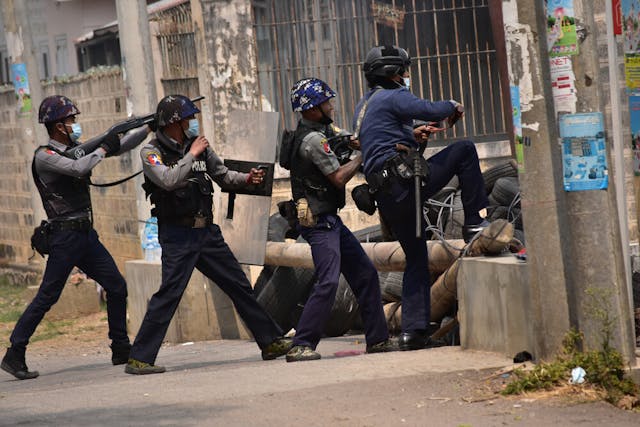過去數年,在泰緬邊境從事非法活動的詐騙集團,已經導致數十萬人(主要是華裔)受傷害。隨着中國、泰國和緬甸三方加強跨境合作,當局已逮捕和引渡大量的犯罪分子,在遏制緬泰邊境詐騙集團的猖獗行為暫時取得勝利,但要持續打擊仍是一項挑戰。
2月14日,邊境部隊決定驅逐那些從事詐騙活動的犯罪分子,他們是緬甸武裝部隊的一個分支,由2008年之後在地區軍事指揮部的指示下,由緬甸前叛亂分子組成。如果泰國當局願意接受引渡這些犯罪嫌疑人,緬甸將每天向泰國當局移交50名疑犯,泰國為此將與中國駐泰國的官員溝通。
據泰方稱,緬甸政府將釋放261名無辜受害者,另將7000人釋放到泰國,然後由泰方交中國官員跟進處理。
要維護區內國家利益 必須打擊詐騙
2月17日,中國外交部發言人郭嘉昆表示,近期在泰緬邊境一帶發生的網賭電騙惡性案件,威脅包括中國、泰國在內有關國家公民的生命和財產安全,干擾地區國家正常的交往合作。堅決打擊此類犯罪是落實以人民為中心發展思想的切實體現,也是維護地區國家共同利益的必然選擇,符合各國民眾的共同期待。
與此同時,緬甸、中國和泰國的高級官員也前往妙瓦底的詐騙園區視察。雙方成立了聯合工作小組,打擊詐騙犯罪和網絡犯罪,並加速將犯罪者和受害者從緬甸經泰國引渡至中國。

從2025年1月30日至2月16日,約1030名非法移民進入緬甸的外國人受到檢查和控制。這些人正在接受中泰緬聯合工作小組的進一步調查,該工作小組負責識別嫌疑人和受害者,然後實施引渡程序。
泰國警方估計,包括華人在內的1萬名外國人將從緬甸的KK園區中獲救。據了解,泰國當局正在國家轉介機制框架下與緬甸官員商討,以核實人口販運受害者身份,並將其遣回有關國家,泰方並充當了調解人角色,幫助核實受害者身份,並確定他們會否要起訴人口販子和詐騙者。
另一方面,中國公安部長助理劉忠義2月17日與其他26名中國代表抵達泰國,參加三國聯合行動,打擊以華人為首的緬東詐騙集團。聯合執法行動開始了兩個月的工作,行動中,詐騙集團成員與受害者會被分開處理。隨着緬甸東部地區的電力、石油和網絡服務遭斷供,打擊詐騙集團的行動亦拉開了序幕。此舉迫使緬甸政府和少數民族迅速採取行動,鎮壓境內的詐騙團夥,連鎖反應顯示斷電、斷油、斷網行動的有效性。
斷供電力能源 迫軍閥出手鎮壓
據泰國北碧府消息報道,民主克倫佛教軍逮捕了86名涉嫌在緬甸邊境帕亞松如(Payathonzu)鎮經營詐騙集團的華人。這些中國人被拘留在一個仍運作的線上賭博場所中。顯然,斷供電力和石油確實迫使緬甸當地的軍閥出手鎮壓詐騙集團。
2月17日,緬甸當地官員表示,聯合安全部隊已解救來自8個國家的731人,其中包括來自中國、泰國、印尼、印度、馬來西亞、巴基斯坦、越南和衣索比亞的受害者。受害者似乎遍布亞洲各國,這意味着詐騙者可能也來自不同國家。

2月18日,泰國警方在曼谷和當地其他省份逮捕了10名泰中投資的詐騙集團成員。他們以欺詐、電腦犯罪、洗錢和非法集會等罪名遭到指控。犯罪嫌疑人不僅包括擁有受害人帳戶的泰國居民,還有中國的電話詐騙者和洗錢者,甚至還有韓國人。顯然,犯罪嫌疑人利用個人關係網的優勢,參與詐騙集團的跨國違法活動。
2月20日,泰國當局考慮進一步限制泰緬邊境的網絡存取。他們成立了一個委員會,訪問了泰國達府的湄索地區,以評估限制網絡存取對居民的潛在影響。泰國國家電信公共有限公司、電信營運商和國家廣播和電信委員會的官員均是委員會的成員。
此外,詐騙集團傾向於將其盜取的資產轉換為加密貨幣,而追回非法數位資產的過程相當複雜,成為官方打擊詐騙集團的一項挑戰。
邀社媒平台共商反詐騙對策
2月21日,泰國政府邀請Facebook和TikTok等社交媒體平台代表討論應對網絡詐騙犯罪的方法,因為愈來愈多人成為Facebook和TikTok網絡詐騙的受害者。
綜上所述,中泰緬三方聯合打擊詐騙犯罪集團已取得不錯成果。泰國當局透過與緬中兩國政府合作,打擊緬甸東部詐騙集團的努力值得讚揚。
但如何維持今次跨國合作的良好勢頭,以盡量減少亞洲國家的受害者,並繼續引渡和懲罰參與詐騙活動的犯罪分子,仍有待觀察。除了中泰緬三國聯合行動外,多國也必須同時推行廣泛的教育活動,提醒公民防範詐騙集團層出不窮的手法,盡量減少受害者。
Sino-Thai-Myanmar cooperation in the combat against scam syndicates
China, Thailand, and Myanmar’s joint efforts against scam syndicates have led to significant arrests and extraditions, but sustaining this momentum remains a challenge
The emergence and proliferation of scam syndicates have triggered a tripartite cooperation between China, Thailand, and Myanmar in the combat against their illegal activities that victimised hundreds of thousands of people, who are mainly of ethnic Chinese origin. Such cooperation has marked at least a temporary triumph of transnational governance in curbing the growth of scam syndicates along the border of Myanmar and Thailand. It remains to be seen whether the current momentum in the joint fight against scam syndicates will persist.
On 14 February, the Border Guard Forces, which are the subdivisions of the Tatmadaw (Myanmar Armed Forces) composed of the former insurgents in Myanmar under the instructions of the regional military commands after 2008, decided to expel those criminal elements engaging in scam activities (United Daily News, 14 February 2025). If the Thai authorities are willing to accept the extradition of these criminal suspects, the Myanmar side would transfer 50 suspects daily to the Thai authorities, who would communicate with the officials of the People’s Republic of China (PRC) in Thailand.
In fact, in November 2024, it was reported that the Myanmar side returned as many as 10,000 Chinese criminal suspects and victims to the PRC, whose law enforcement authorities eventually prosecuted 29,000 ethnic Chinese as a serious warning to those organising scam syndicates in northern Myanmar.
According to the Thai authorities, the Myanmar government would release 261 innocent victims and then 7,000 people to Thailand, which then handled them to the PRC officials.
On 17 February, the PRC Foreign Ministry spokesperson Guo Jiakun referred to the scam activities along the Thai-Myanmar border as being detrimental to the life, properties, and safety of the citizens of the PRC, Thailand, and other countries. These scam activities, to Guo, also disturbed the normal interactions and cooperation between countries in the region. As such, China is determined to fight scam syndicates, to implement the idea of people-centred development, to protect the common interests of the countries in the region, and to act in accordance with the common aspirations of the citizens of these countries (Wen Wei Po, 17 February 2025).
At the same time, high-ranking officials of Myanmar, China, and Thailand went to the scam parks in Myawaddy. They set up a joint working group to combat scam crime and internet crime and to accelerate the process of extraditing the criminal elements and victims from Myanmar to China through Thailand.
From 30 January to 16 February 2025, about 1,030 foreigners who were illegal migrants into Myanmar were inspected and controlled. These people were under further investigation by the Sino-Thai-Myanmar joint working group, which was responsible for identifying the suspects and victims and then implementing the extradition procedures (Wen Wei Po, 17 February 2025).
On 20 February 2025, a batch of 200 Chinese were returned to China by Myanmar through Thailand (United Daily News, 21 February 2025). They took the Chinese airline to return to Nanjing’s international airport. Most of the returnees were reportedly victims of scam crimes, while a minority belonged to the organisers of the scam syndicates.
According to the Thai Defence Minister, Phumtham Wechayachai, the week of 20 February witnessed a total of 600 Chinese being returned from Myanmar to China through Thailand—clear evidence of the victory of the Sino-Thai-Myanmar combat against scam syndicates.
The Royal Thai Police estimated that 10,000 foreign nationals, including Chinese, would be rescued from scam parks in Myanmar. Police General Thatchai Pitaneelabott, who was also the director of the Thai police’s anti-human trafficking centre and police cyber taskforce, added that the Thai authorities were discussing with the Myanmar counterparts under the national referral mechanism framework to verify and return the victims of human trafficking to their countries concerned (Bangkok Post, 17 February 2025). He also said that Thailand acted as a facilitator, helping the process of verifying the victims and identifying those who may want to sue the traffickers and scammers—a legal process in which they must file their legal complaints with the Myanmar authorities.
It was noteworthy that Thatchai Pitaneelabott had earlier briefed the representatives of foreign embassies, including the United Nations Office on Drugs and Crime and the US Embassy’s Homeland Security Investigation Office, on not only the situation of scam syndicates and human trafficking but also the locations of scammers and how to distinguish the victims from the criminal perpetrators.
On the other hand, the PRC’s Assistant Minister for Public Security, Liu Zhongyi, arrived in Thailand on 17 February with 26 other Chinese delegates to participate in the three-country joint operation against the Chinese-led scam syndicates based in eastern Myanmar. The joint operation began its work for two months. Operationally, the scam syndicate members were separated from the victims, and they were formally arrested. The anti-scam operation was kicked off with the termination of the supply of electricity, oil, and internet in the affected regions of eastern Myanmar. Such an action forced the Myanmar government and the ethnic groups to take swift action to suppress scam gangs on their territories—a chain reaction showing the effectiveness of the action of cutting off the electricity, oil, and internet supply.
In fact, it was reported that in Kanchanaburi, the Democratic Karen Buddhist Army arrested 86 Chinese who were suspected of operating scam syndicates in the Payathonzu township. These Chinese were taken into custody at a facility where an online gambling den was still operating. Apparently, the termination of electricity and oil supplies did force the local warlords of Myanmar to suppress the scam syndicates.
On 17 February, a local Myanmar official said that a combined security force had rescued 731 people from eight countries, including victims from China, Thailand, Indonesia, India, Malaysia, Pakistan, Vietnam, and Ethiopia (Bangkok Post, 17 February 2025). It appeared that the victims spread across different Asian countries, implying that the scam operators likely came from different countries.
On 18 February, the Thai police arrested ten suspected members of a Thai-Chinese investment scam syndicate in Bangkok and other local provinces. They were charged with fraud, computer crime, money laundering, and illegal assembly. The criminal suspects included not only Thai owners of mule accounts but also Chinese call scammers and money launderers and even Koreans. Obviously, criminal suspects involved transborder actors who took advantage of their personal networks to engage in investment scam syndicates (Bangkok Post, 18 February 2025).
On 20 February, the Thai authorities considered further restrictions on internet access along the Thai-Myanmar border. They set up a committee with members visiting the Mae Sot district in the Tak province to assess the potential impact of restricting internet access on the residents. Officials from the National Telecom Public Company Limited, telecommunication operators, and the National Broadcasting and Telecommunications Commission participated in the committee work (Bangkok Post, 20 February 2025). One challenge in the crusade against scam syndicates is the tendency of scam gangs to convert their stolen assets into cryptocurrency—a complex process in the recovery of illegal digital assets.
On 21 February, the Thai government invited representatives from social media platforms, including Facebook and TikTok, to discuss methods of tackling online scam crime because an increasing number of people became the victims of online scams on Facebook and TikTok (Bangkok Post, 21 February 2025).
In conclusion, the joint tripartite efforts involving China, Thailand, and Myanmar to combat scam syndicates have appeared to achieve fruitful results. The efforts made by the Thai authorities to combat scam syndicates in the eastern part of Myanmar through intergovernmental cooperation with Myanmar and China must be commended.
However, it remains to be seen how the momentum of the three-country joint operation will be sustained so that the victims of Asian countries will be minimised and the criminal elements involved in scam operations will continue to be extradited and penalised. Apart from the joint operation involving China, Thailand, and Myanmar, an extensive education campaign to warn citizens against scam syndicates must be launched simultaneously in China, Thailand, and other Asian countries so that the victims will continue to be minimised to the full extent.
原刊於澳門新聞通訊社(MNA)網站,本社獲作者授權轉載。(原文按此)











































